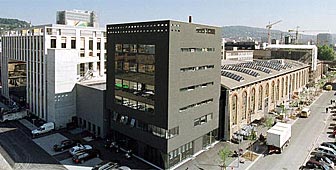Arts complex inaugurated in former Zurich industrial estate

A new complex housing Zurich's main theatre, the Schauspielhaus, has been inaugurated in the presence of art critics from around Europe. The move also coincided with the theatre's first production under its new director, Christoph Marthaler.
The changes are part of a thorough rejuvenation process which the Schauspielhaus is undergoing.
Besides the new venue and new director, the theatre’s traditional venue, the “Pfauenbühne”, is being entirely renovated. The Pfaunbühne became world-famous for staging plays by German authors during the Second World War whose works were banned in Nazi Germany.
The most lasting change, however, will come from the new building, the Schiffbau, named after its former use as an industrial shipyard. At the centre of the arts complex is a 120-metre-long building made of bricks and cast iron over a century ago.
Sulzer, Escher and Wyss, perhaps Switzerland’s most famous producer of machines and turbines, made ships there from the mid-19th century to 1940, and turbines thereafter.
The old structure has been left largely intact. However, several modern structures – “buildings within buildings” – were incorporated to give room to two theatre stages, a restaurant and the Moods Jazz Club. In addition, an entirely new four-storey block was built alongside the historic Schiffbau by the Viennese architects, Ortner & Ortner.
The new building houses all Schauspielhaus workshops, warehouses, rehearsal facilities, and offices. The first floor has a courtyard which is completely closed to the busy district outside, and which can be used as an open-air stage.
The rooms of the upper floors are connected by balconies which can be used by audiences, in a modern version of Shakespeare’s Globe Theatre.
The building also houses over 20 apartments. The sale of these and of office space, allowed the Schauspielhaus to go ahead with the SFr80 million investment. Only SFr11 million were covered by state subsidies.
When the Schauspielhaus bought the disused industrial area of over 10,000 square metres from Escher, Wyss in the early 1990s, there were no plans to turn it into an arts complex.
“We needed room to improve our infrastructure”, says Marcel Müller, commercial director of the Schauspielhaus. “Our rehearsal studios, warehouses and workshops were scattered across town. It had become terribly inefficient.”
There was another reason why using the Schiffbau as an arts complex was out of the question in the early nineties. The area, in the middle of Zurich’s western industrial district, was haunted by the infamous open drugs scene.
But when things improved and Zurich’s District Five underwent a process of gentrification, the Schauspielhaus not only followed the trend, but actually led it according to Müller.
“I think we can say that the district has taken a turn for the better partly because of our move. Several other investors have since followed: hotels, bars, a cinema complex, and apartments on abandoned industrial premises. It’s an exciting urban development, which will also see the construction of Zurich’s new main stadium”, Müller says.
The new venue, which Müller hopes “will radiate across Europe because of its unique combination of venues, bars, restaurant and jazz club”, opened with “Hotel Angst”, a play by the new Schauspielhaus director and author, Christoph Marthaler.
Marthaler, who is from Zurich, was the darling of the Swiss “off” theatre scene in the 1980s before he made a career in Berlin.
The Swiss press has hailed his return, and has remarked that it is fitting that he should take over just as the theatre opens a new complex whose venues can easily be adapted to his wishes and those of other producers – a feature normally associated with “off” theatre productions.
“Hotel Angst” makes full use of the Schiffbau, using its walls as part of the set. The play is set in an uncomfortable hotel, which serves as a metaphor for present-day Switzerland. Its guests are a dozen grumpy men who, in their dull frustration with life, turn against each other, the female staff, and especially against the occasional foreigner who arrives.
Marthaler, an avowed pub-goer, has a precise observation of the language and mentality of the “ugly Swiss”. “Hotel Angst” is full of rude language and xenophobic and philistine behaviour.
But critics have remarked that the play, which is really more a sequence of more or less absurd situations, treads a worn path. The “ugly Swiss”, whose politics are invariably right-wing, has become a cliché.
Moreover, he – the cliché is also invariably male – doesn’t as a rule go to the theatre, much less to see Marthaler’s plays. So if satire is meant to sting the audience, “Hotel Angst” fails to impress.
by Markus Haefliger

In compliance with the JTI standards
More: SWI swissinfo.ch certified by the Journalism Trust Initiative
You can find an overview of ongoing debates with our journalists here . Please join us!
If you want to start a conversation about a topic raised in this article or want to report factual errors, email us at english@swissinfo.ch.